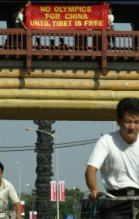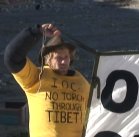An interview with Jamyang Norbu - part 1
I tried something new today. Inspired by my interview with Amber Mac on WebNation, I interviewed Jamyang Norbu via skype. It worked ok besides the occasional feedback (sorry!) and this is the first of three parts.
Jamyang Norbu is an acclaimed Tibetan writer, thinker and activist. His novel, The Mandala of Sherlock Holmes, won the Crossword Book Award - India’s highest literary prize. He has lived many lives in the Tibetan exile community including a brief stint in the Tibetan resistance. He served as Director of the Tibetan Institute of the Performing Arts (TIPA) and a founding member of the Tibetan Youth Congress. Jamyang’s many articles and commentaries on Tibetan society and politics have informed, inspired and sometimes even enraged countless Tibetans. The boldness of his voice, the clarity of his opinions, and the elegance of his language has challenged a generation of Tibetans to open their minds, and encouraged more than a few to pick up the pen and be courageous in their writing.
Jamyang is also my cousin. I remember when I was around 16 years old and he came to Victoria, BC on a speaking tour with Lhasang Tsering - former member of the Tibetan resistance force in Mustang, Nepal; two-term President of the Tibetan Youth Congress; and another giant in the Tibetan freedom struggle. We stayed up late that evening listening to Jamyang and Lhasang talk passionately about the Tibetan political situation. At one point Jamyang was speaking in such an animated way that his plate of food ended up flying from his lap and onto the floor. Little did I know what an important role Jamyang would play in helping to inform and shape my political understanding and activism for Tibet.
We were speaking on the phone today about the timeliness and importance of letting people know about the Boycott campaign - http://www.boycottmadeinchina.org/ - when I asked him if he would do a short interview for BeijingWideOpen. I know many young Tibetans want to hear his thoughts and opinions more, and I think others who are new to the Tibet issue would benefit from hearing his views. Jamyang has an incredible ability to take a seemingly muddled topic or debate and make things clear and simple by always focusing on the fundamental human desire for dignity and justice. You can never be sure of what he might say next but one thing is always certain - when it comes to taking on detractors of the Tibetan fight for independence, his words can be like daggers.
Posted: September 10th, 2007 under Impressions, Video.
translate:
Comments: 12
Comments
Comment from TenChoe
Time: September 10, 2007, 11:09 pm
Daggers for sure! Can we have a JN special series on Youtube, a part of the SFT tv?
Comment from Sonor
Time: September 11, 2007, 8:35 am
Lhadon la,
I must say it’s a great idea that you’re taking this Blog to the next level starting with your interview with Jamyang la. Great start! Well done & thanks a lot as always for what you’ve done so far for Tibet.
Free Tibet
Comment from Gaychey
Time: September 11, 2007, 8:26 pm
Jamyang Norbula is an inspiration. Thanks for the interview. Looking forward to watching the next part.
Comment from RangzenRoblang
Time: September 11, 2007, 11:31 pm
Brilliant. Looking forward to part 2
Comment from Rinzin
Time: September 12, 2007, 12:56 pm
Awesome! Looking forward to the part 2 and part 3!
Comment from Mich
Time: September 13, 2007, 6:24 am
hello ! I read the book “The mandala of Sherlock Holmes” years ago, wonderfull !!! Does exists some tibetan, popular, and not strictly religious litterature ?
Comment from Rich Felker
Time: September 14, 2007, 11:44 am
While I was in Lhasa, I heard there’s an instructor at Tibet University writing romance novels. Someone I met in the market (near the Barkor) had one of them. There are actually a lot of books in Tibetan available in Tibet, but sadly I never took the time to browse too much. One I did skim through though was an illustrated history of all the great advancements of 20th century civilization. Quite tellingly, the Communist Revolution and the “Peaceful Liberation” were not mentioned whatsoever, while political and (moreso) scientific and technological revolutions elsewhere were.
Outside Tibet there seems to be a good deal of political works written in Tibetan. Palden Gyatso’s autobiography, Bagdro’s, HHDL’s books, …
And of course, let’s not forget Gedun Chopel.
Comment from Mich
Time: September 14, 2007, 4:07 pm
Thanks for this information. I can’t imagine what sort of romance novel is published now in Tibet. I can’t imagine who should be interested in any official and allowed litterature.
About autobiographies, I read a few days ago Palden Gyatso’s and Tendzin Tcheudrak’s autobiographies.
Anybody in the world should read them.
Comment from Camis
Time: September 14, 2007, 6:06 pm
I just read two Mystery Novels set in modern day Tibet. The author is Eliot Pattison, a westerner. These are old-fashioned detective stories - quite complex, with all the usual elements of the genre. I read them in English, not sure about translations.
There is LOTS of commentary about the political oppression in Tibet woven into the storyline. It pervades the story in profound ways. I live in California and have not been to Tibet, so I can’t vouch for the authenticity. But from what I have learned in thirty years of study and practice, it sounded about right to me. The censors must have missed these books, or maybe they just couldn’t touch them. I just revealed that I am not currently a student, but hey I used to be. Hope that’s okay here.
If any of you who are Tibetan ever read these books, I’d LOVE to get your opinion.
Comment from Jess R.
Time: October 5, 2007, 12:54 pm
As an inji who has participated in the mvmt for rangzen for almost 10 years now, I completely agree with Jamyang-la. It is our role as allies to support the Tibetan leadership and Tibetan’s views not to go against them. I think we should share our skills to collaborate and strengthen the movement but it is not our place to critisize actions taken when it is clear that the majority of Tibetans are in favor of them and feel the actions are just and of benefit.
Jessica
Comment from Wener H. Fischer
Time: April 14, 2008, 8:12 am
Hello - just hope Mr.Jamyang Norbu would come one day to Helsinki and he could make a speech in public on the tibetan independence “issue”
tashi delek - rangzen
werner h. fischer - helsinki/finland
Comment from Christine
Time: July 5, 2008, 10:02 am
Discursive inclusion offers greater potential for democracy; that being said, China has been always exclusive. People say that there is freedom of speech and information in China. Of course there is, but the question we have to ask is what kind of information and how is freedom of speech being exercised? There are limits to what can be said in China, surprisingly even the Chinese, who are the most eligible to question/criticise the government can’t do so. As a result there is a monopoly of discourse in China. The exclusiveness of discourse in China denies alternatives and possibilities not just for Tibetans but for Chinese themselves. It is through blogs like this that open spaces for other discourses to exist. Blogs like this seek to leave spaces open for talk. Only when discourses are left open (that one that is at least inclusive) that change becomes possible.










Write a comment